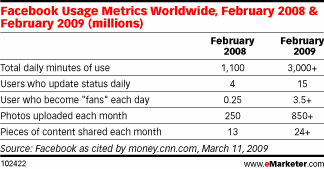¿Pueden ser rentables las redes sociales?
 El gran problema de Facebook, Twitter y otras redes sociales es que suman monumentales cifras de usuarios, pero son incapaces de tener un modelo de negocios. Facebook es el mejor (o peor) ejemplo: tiene 200 millones de usuarios, 295 millones de visitantes únicos (sólo en marzo), pero su crecimiento más que beneficios, le ha traído problemas. Básicamente mayor necesidad de financiamiento, que en general viene de capital de riesgo. Pero los avisadores no quieren sólo números, quieren perfiles, una audiencia medida, aunque no sea en profundidad. Pero en el caso de Facebook, el rastreo choca frontalmente con la privacidad de la información. La compañía fundada por Mark Zuckerberg recientemente mostró un modelo de avisaje que utiliza hasta dos tercios de las páginas, que no consideran datos demográficos sensibles. Pero eso no es suficiente. Facebook necesita usar su enorme y diversa base de datos. Una compañía ha comenzado a filtrar la información y a rastrear datos, según cuenta el siguiente artículo de The Wired, lo que abre una puerta a un modelo que evidentemente será una señal para la industria y los medios.
El gran problema de Facebook, Twitter y otras redes sociales es que suman monumentales cifras de usuarios, pero son incapaces de tener un modelo de negocios. Facebook es el mejor (o peor) ejemplo: tiene 200 millones de usuarios, 295 millones de visitantes únicos (sólo en marzo), pero su crecimiento más que beneficios, le ha traído problemas. Básicamente mayor necesidad de financiamiento, que en general viene de capital de riesgo. Pero los avisadores no quieren sólo números, quieren perfiles, una audiencia medida, aunque no sea en profundidad. Pero en el caso de Facebook, el rastreo choca frontalmente con la privacidad de la información. La compañía fundada por Mark Zuckerberg recientemente mostró un modelo de avisaje que utiliza hasta dos tercios de las páginas, que no consideran datos demográficos sensibles. Pero eso no es suficiente. Facebook necesita usar su enorme y diversa base de datos. Una compañía ha comenzado a filtrar la información y a rastrear datos, según cuenta el siguiente artículo de The Wired, lo que abre una puerta a un modelo que evidentemente será una señal para la industria y los medios.The rich personal data many of us enter into these networks is a treasure trove for marketers whose job it is to target us with ever-increasing precision.
 Never before have we voluntarily publicized so much of our personal data and consumption preferences, especially not in very structured ways that ease the work of marketer’s data scrapers (Compare Facebook’s categorized favorites listings to old Geocities free-for-all web designs). And most of it accurately reflects what’s going on in our actual lives, according to Sree Nagarajan, founder, president and CEO of Colligent, which gives marketers a way to hit us up in the offline world using information gleaned online.
Never before have we voluntarily publicized so much of our personal data and consumption preferences, especially not in very structured ways that ease the work of marketer’s data scrapers (Compare Facebook’s categorized favorites listings to old Geocities free-for-all web designs). And most of it accurately reflects what’s going on in our actual lives, according to Sree Nagarajan, founder, president and CEO of Colligent, which gives marketers a way to hit us up in the offline world using information gleaned online.
“If you think about your Facebook profile,” said Nagarajan, “95 percent of what you describe there is not about your online life, even though it is online. You’re talking about your hobbies, you’re talking about your interests, your favorite TV show or your favorite band.” Social networking sites allow his company to measure content’s “stickiness” — not only what you watched, but how much you liked it based on your Facebook profile, YouTube video ratings, and so on.

0 Comentarios:
Publicar un comentario
Suscribirse a Comentarios de la entrada [Atom]
<< Página Principal